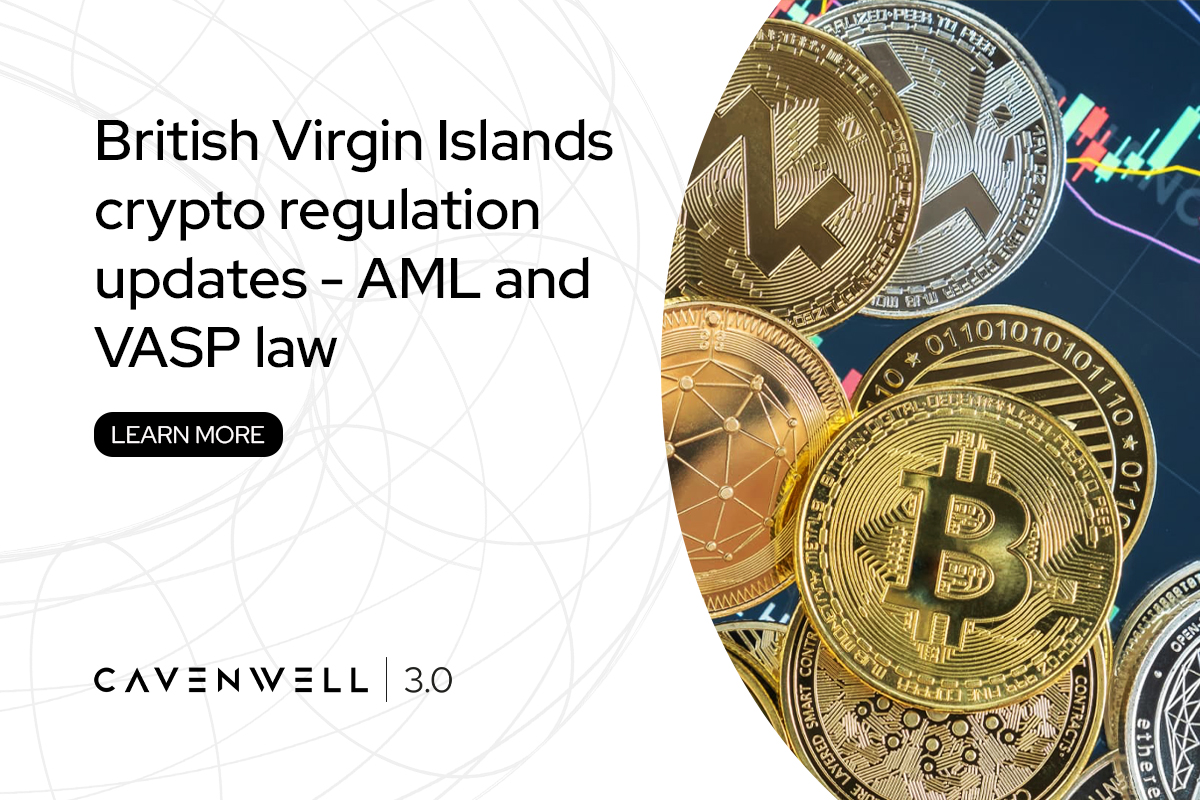British Virgin Islands Crypto Regulation Updates – AML and VASP Law
Over the last 18 months, there has regularly been talk of the British Virgin Islands (BVI) introducing regulation for crypto and blockchain businesses as the jurisdiction seeks to align itself with international standards set by the Financial Action Task Force (FATF).
That time has finally come.
The changes to the BVI crypto regulatory regime come in 2 parts:
The first, is an amendment to the Anti-Money Laundering laws, which will now bring crypto businesses, officially “Virtual Asset Service Providers (VASPs)” in scope of the existing AML regulations. The amendment law has already been enacted and BVI companies have until 1st December 2022 to comply.
The second, is the introduction of a specific regulatory licensing regime for VASPs. The incoming VASP law has for now only been published in draft form, but is expected to be enacted by the end of 2022 or early 2023, at which point a 6 month transition period will apply.
What do the Crypto Anti-Money Laundering Law changes mean?
From 1st December 2022, crypto businesses whose activities fall within the definition of a “Virtual Asset Service Provider” (VASP) will have to comply with the requirements of the AML law, which in summary will include obligations to:
- Appoint a money laundering reporting officer (MLRO) ie. a person qualified to be responsible for AML/CFT compliance and reporting of suspicious activity/transactions
- Establish and maintain policies and procedures for AML/CFT
- Provide training to staff on their AML/CFT obligations and internal policies and procedures
- Comply with the new “travel rule” in relation to transfers of virtual assets. ie. to obtain, verify, and maintain complete information on the originator and beneficiary of each transfer
The BVI Crypto Regulatory and Licensing changes
The new BVI crypto regulations, currently the Virtual Asset Service Provider Bill, will require those crypto businesses whose activities fall within the definitions of a “Virtual Asset Service Provider”, to register with the Financial Services Commission.
As part of this registration, businesses will be expected to meet the following obligations:
- anti-money laundering obligations;
- data protection and cyber security obligations;
- the filing of annual accounts with the FSC and ongoing financial reporting;
- the requirement for senior officers and beneficial owners to be fit and proper persons;
- the prior approval of senior officer appointments by the FSC; and
- have a dedicated compliance officer.
The incoming VASP law has for now only been published in draft form, and is open to a period of consultation until 23rd September to which Cavenwell is responding to. After this process is complete there will be more clarity on timelines and final requirements but is expected to be enacted by the end of 2022 or early 2023, at which point a 6 month transition period will apply.
What is a VASP?
A “VASP” means a virtual asset service provider who provides, as a business, one or more of the following activities or operations for or on behalf of another person:
(a) exchange between virtual assets and fiat currencies;
(b) exchange between one or more forms of virtual assets;
(c) transfer of virtual assets, where the transfer relates to conducting a transaction on behalf of another person that moves a virtual asset from one virtual asset address or account to another; (d) safekeeping or administration of virtual assets or instruments enabling control over virtual assets;
(e) participation in, and provision of, financial services related to an issuer’s offer or sale of a virtual asset;
(f) perform such other activity or operation as may be specified by enactment.
The definition is derived from the Financial Action Task Force requirements, and as such, is very similar to that provided in other jurisdictions.
There appears to be consensus amongst a number of BVI lawyers that the issuance of tokens (so long as it is not on behalf of another person) is unlikely to be in scope.
What does this mean for the BVI as a leading crypto jurisdiction?
We previously wrote on how the British Virgin Islands were one of the most popular jurisdictions for businesses in the crypto and blockchain space, and for many, that will continue to be the case.
For many, the appeal of the BVI was the ability to get to market straight away and from a relatively low cost base, the perfect conditions for pioneers seeking to test the latest innovations in blockchain technology.
Despite this, the BVI is one of the last remaining jurisdictions to introduce some form of VASP law and as we reach this point there we will likely see a reduction in jurisdiction hopping, as projects seek a jurisdiction and regulatory regime to settle down in, likely focused less on finding the lightest touch requirements and instead, on which regulators provide clear guidance and an efficient licensing/registration processes and what else the jurisdiction has to offer.
How can Cavenwell 3.0 help?
As a crypto specialist corporate services provider and consultant, we have a wealth of experience in the Web 3 space and regulatory compliance.
Whether you want to assess if your business is in scope, understand your options around relocating to other jurisdictions, or want assistance meeting your compliance requirements such as appointing an MLRO or compliance personnel, or creating policies and procedures, we can help.
The content of this article is intended to provide a general guide to the subject matter. Specialist advice should be sought about your specific circumstances.


